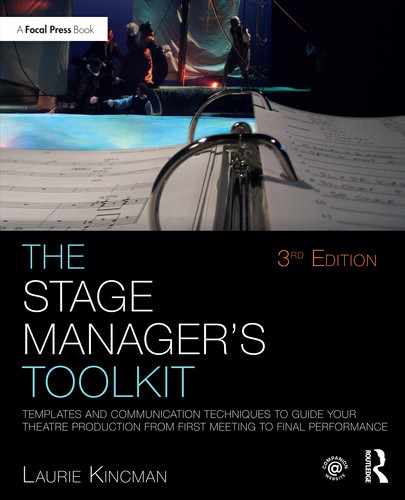Preface to the Third Edition
I have been truly honored by both the public and critical response to the first two editions of The Stage Manager’s Toolkit. This book was a project that sat in my head for several years, and to have the excitement I felt in putting my thoughts on the page met with warmth and enthusiasm made the effort that much more worthwhile. And as happened with the inquiry about a second edition, the email initiating this third incarnation of this book renewed my excitement to share ideas, experiences, and tips with stage managers newly entering the field.
This third edition of The Stage Manager’s Toolkit builds on my updates to the book in the second edition with new production examples, additional perspectives from young stage managers now making their way in the world, and the expanded exploration of the role of the Assistant Stage Manager. My passion for stage managing dance continues to be reflected in the book—both on its own and as a language useful for approaching either musical theatre or the movement-intense play. I have also included new sections about safety in rehearsals and how to create a healthy rehearsal atmosphere.
I maintain my premise that successful communication is the most important responsibility of the stage manager, so the written and verbal communication techniques and examples in the book are complemented by an as-promised expansion of the computer-based tools available to stage managers today. I will forever be an “old school” SM who takes blocking with a pencil in a hard-copy prompt book and values the feel of a stopwatch in my hand, but the improvements in collaborative platforms such as Dropbox and Google Drive, digital approaches to line notes and other paperwork, and worthy updates to the concept of a digital prompt script can and should be part of the conversation. I have enjoyed exploring these tools and am happy to share them with you.
The third edition also tightens the focus of the book on student and early-career stage managers by providing an expanded look at Actors’ Equity Association and the guidelines which promote safety on our stages and dictate the conditions under which we work. In addition to the general stage management sidebars in the book, a new series of Equity Tips focuses on specific provisions relevant to each stage of the production process.
Although not found in these pages, the companion website for The Stage Manager’s Toolkit has also undergone some changes. The templates and sample forms, video examples of cue calling, and web links are joined by the second edition material on how to teach stage management—where I’ve been able to add additional project ideas and offer comments about how or why I take a specific approach in my classrooms.
During a very cold week in January 2014 I had the great honor of spending time with Tom Kelly, a legendary stage manager and stage management author, during a workshop in Chicago about stage combat. We had the chance to chat about the fact that I had also endeavored to capture the world of stage management on the page. And while I in no way attempt to promote myself to similar legend status—and fully admit to being too star-struck to remember his words exactly—what I cannot forget is our mutual love of the job and the gratitude we seemed to share for the chance to write it all down.
And with that, places please for the top of Edition Three!
